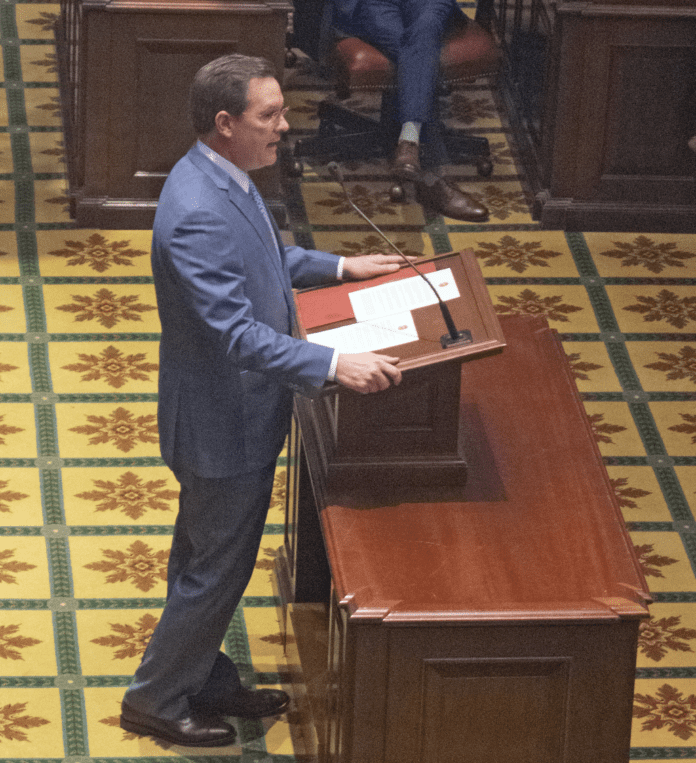by Kimberlee Kruesi and Jonathan Mattise —
NASHVILLE – One of Tennessee’s most influential Republican lawmakers says the state should stop accepting the nearly $1.8 billion of federal K-12 education dollars that help provide support for low-income students, English learners and students with disabilities.
House Speaker Cameron Sexton told The Associated Press that he has introduced a bill to explore the idea during this year’s legislative session and has begun discussions with Gov. Bill Lee and other key GOP lawmakers.
“Basically, we’ll be able to educate the kids how Tennessee sees fit,” Sexton said, pointing that rejecting the money would mean that Tennessee would no longer have “federal government interference.”
To date, no state has successfully rejected federal education funds even as state and local officials have long grumbled about some of the requirements and testing that at times come attached to the money. The idea has also come up elsewhere in recent months among GOP officials, including in Oklahoma and South Carolina.
Many Republican politicians and candidates at the federal level have also made a habit of calling for the outright elimination of the U.S. Department of Education.
According to Sexton, Tennessee is currently in the financial position to use state tax dollars to replace federal education funds. He pointed to the $3.2 billion in new spending outlined in Gov. Lee’s recent budget proposal for the upcoming fiscal year as proof that the state could easily cover the federal government’s portion.
Federal dollars make up a small slice of Tennessee’s K-12 education funding, which had an almost $8.3 billion budget as of fiscal year 2023. Yet the federal money is seen as a key tool to supporting schools in low-income areas and special education.
Sexton says he has been mulling the proposal for a while, but this week, he publicly touted the idea in front of a packed room full of lawmakers, lobbyists and other leaders at the Tennessee Farm Bureau luncheon on Tuesday.
“We as a state can lead the nation once again in telling the federal government that they can keep their money and we’ll just do things the Tennessee way,” Sexton said at the event. “And that should start, first and foremost, with the Department of Education.”
Spokespersons for both Gov. Lee and Sen. Randy McNally appeared open to entertaining Sexton’s proposal.
“Although we haven’t seen the details of the legislation yet, the governor is always interested in working with the speaker to ensure Tennessee students have the best access to a high-quality education,” said Lee’s spokesperson, Jade Byers.
McNally said he was open to the proposal, saying that “federal mandates in the area of education can be overly burdensome.”
“McNally thinks a discussion about forgoing this money, a relatively small part of overall education funding, in order to maintain more control over how we educate our Tennessee students is a constructive conversation to have,” spokesperson Adam Kleinheider said.
Democratic Rep. Bo Mitchell said he had several concerns about forgoing federal education funding, particularly knowing that the money currently goes to support students with disabilities and low-income students.
“I’m concerned about their rights and Tennessee being able to provide those services and uphold their rights,” Mitchell said.
Advocacy groups also raised alarm, with the Tennessee Disability Coalition saying they were “very disappointed” with Sexton’s proposal.
“These funds represent the best, strongest bootstraps these students have for successfully living and working in our communities,” spokesperson Tom Jedlowski said.
Meanwhile, the Teacher Education Association’s President Tanya Coats said Tennessee needs “every dollar we can invest” even if it comes with “federal strings.”
In Republican-dominant Tennessee, GOP lawmakers have increasingly become more skeptical and combative over what is taught inside public classrooms — particularly over race and gender issues — and the policies surrounding what services schools offer to students.
And in 2021, the federal department opened investigations into Tennessee and four other Republican-led states that have banned or limited mask requirements in schools, saying the policies could amount to discrimination against students with disabilities or health conditions.
Yet it’s unclear whether Tennessee would have fewer conflicts with the federal government if the state chose to forgo the education funding. While the U.S. Constitution says public education is a state responsibility, states are still required to follow federal laws.



